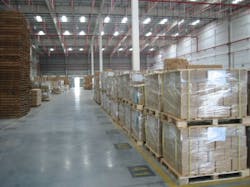Indeed, sometimes they can be directly opposed to one another in the freight world – a scary thought, too, as the margin for error (and profits) often remain quite thin when moving stuff from Point A to Point B.
“I once thought efficiency was synonymous with productivity. It turns out it isn’t,” Gander (seen at right) said. “For operators in our industry – from high-volume express couriers to white-glove freight forwarders – isolated gains in efficiency in one product or service area can actually harm overall company productivity in terms of profit margins, growth, and customer satisfaction.”
Here’s the issue: if you break a freight company’s business down and look at subsets of people or processes individually, he explained, they can be efficient on their own even if their input is actually detrimental to the company’s overall results.
The point, Gander said, is that single metrics can look good even as the business as a whole fails.
“Efficiency impacts other departments and the total supply chain,” he noted, and didn’t truly appreciate the difference this between efficiency and productivity until he witnessed two managers go to war over a system review of their transportation software.
“The first manager obsessed over how fast a single shipment entry could be completed; a margin of three versus four minutes,” Gander detailed. “He put a stake in the ground based solely on a 25% efficiency gain. But because his drive did nothing to automate dispatch, eliminate re-work, or accelerate rating and billing, his ‘efficient’ dream became the other manager’s nightmare.”
The second manager hesitantly admitYet the second manager also firmly believed taking that small amount of extra time to get things right from the very beginning of the freight-shipment process far outweighed the multiplying factors of time and cost to rectify errors or failures later in the supply chain.
“Some in our industry have the mentality that their job is only to send the freight off the dock as quickly as possible; what happens further along the supply chain isn’t their problem,” Gander emphasized.
“But if we make the small, initial effort to correctly register a shipment – with all the proper validations at the point of data entry – integrity and speed can be assured throughout the supply chain,” he noted.
Thus getting it right at the start, rather than fixing it at the end, should be the ultimate goal, Gander said.
“One area’s ‘efficiency’ should not come at the expense of the company’s total throughput or productivity,” he stressed.
Simple, true, but moving freight by truck is anything but simple these days. That’s why Gander thinks automating the smaller, highly repetitive data functions within the freight transport process is the key; but we’ll save that discussion for tomorrow.


